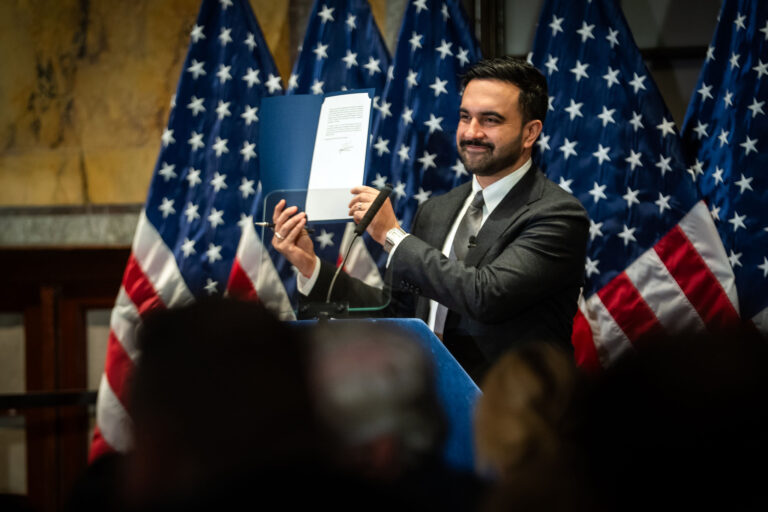 [By Mendel Klein]
[By Mendel Klein]
We are all still in shock. Leiby Kletzky, a young boy from our community is not with us anymore.
He was only 9 years old. He wanted to be a big boy. He wanted to walk home from summer camp alone. But he got lost walking the streets of his Brooklyn neighborhood.
Trying to find his way, evil itself lured him into a car. A 35 year old man took the innocent, defenseless young boy home where he killed him and desecrated his body.
There really isn’t much to say, and even if there is I surely am not the one.
Thousands of people came out to search for young Leiby in the days we were still hoping to find him alive and well. When their efforts turned up futile, thousands more came out to attend Leiby’s heart-wrenching funeral. People from all walks of life came together to help and, thereafter, to mourn together.
Today people are scared.
It could have been my child. It could have been my sibling. It could have been my neighbor. It was one of us. Innocence itself was murdered. Our basic sense of security has been shattered.
For many parents, these fears are automatically translated into a decision to never allow our kids out of our sight. All over the news people are now proclaiming that it’s an age in which no one is safe anymore, and children should not be given any independence.
This response is natural. What happened to Leiby is so unnerving that we reflexively go into the fetal position in an attempt to protect our kids and loved ones while hiding in a corner.
But is this response realistic? Is this reaction healthy? Is it beneficial for our children?
We all remember how after 9/11 people were hesitant to fly on airplanes. The airline suffered tremendous financial losses. People decided not to go into tall buildings. There was a virtual freeze of all high-rise office rentals.
People’s reflexive response was that every airplane is a missile and every tall building is a target. As life returned to normal, people started flying again, entered and stayed in high-rise buildings, and started to realize that this reflexive reaction to tall buildings and airplanes was not realistic.
Resuming normal life after a tragedy of that magnitude felt weird. People were afraid that by going about our daily life we’ll forget about what happened on that horrible day. We were afraid that it might signify that we in some way forgive those who took the lives of so many innocent lives.
It felt weird, yet we slowly resumed our lives. We did not forget. We did not forgive. We simply decided that terror will not prevail.
What happened to Leiby is in no way the fault of his parents who allowed him to walk home alone. It of course is not the fault of his own. Call it fate. Call it coincidence. Call it what you want. What happened to Leiby is the fault of the murderer that took this young innocent life. Leiby was at the wrong place at the wrong time.
After 9/11 we were repeatedly told not to allow the terrorists to win. They wanted to sow fear in our hearts, and by fearing everyday life we would be allowing them to achieve what they set out to do.
I believe the same applies when we assess how to react to this tragedy. We can remember Leiby in two ways: A memory of fear or a memory of love.
We can turn paranoid and consider every person we don’t know thoroughly as a potential murderer. We can stop allowing our children to go and play in the park. We can disallow our kids from going to the corner shop for some ice cream. We can live a life of fear and instill fear and doubt in our children’s hearts based on the horrible tragedy that happened to Leiby.
Or we can become a more unified and loving people. In these trying times we can point out to our kids how thousands of “strangers” came out and searched for little Leiby in the burning July heat. We can be in awe of the thousands of people, again “strangers,” who never met Leiby but attended his funeral and sobbed in public as if it were their own child. We can decide that the action of one murderer will not define how we raise our children, that terror will not prevail.
It is crucial to teach our children about stranger danger. But in memory of Leiby let’s not teach our children that all strangers are evil.
It is important for children to know what to do in case they get lost. But in memory of Leiby let’s not take away any and all independence from our children.
It is ok to teach children to use caution around people they don’t know. But in memory of Leiby let’s not instill fear and paranoia in our children’s hearts.
It is good to know where our kids are at all time. But in memory of Leiby let’s not lock our children up in our houses.
Let’s commemorate Leiby’s memory as one of love, not one of fear.
Mendel Klein is a parent and a pediatric occupational therapist.
NOTE: The views expressed here are those of the authors and do not necessarily represent or reflect the views of YWN.











3 Responses
Well said.
Thank You Mendel.
Thanks for putting my thoughts down so clear!